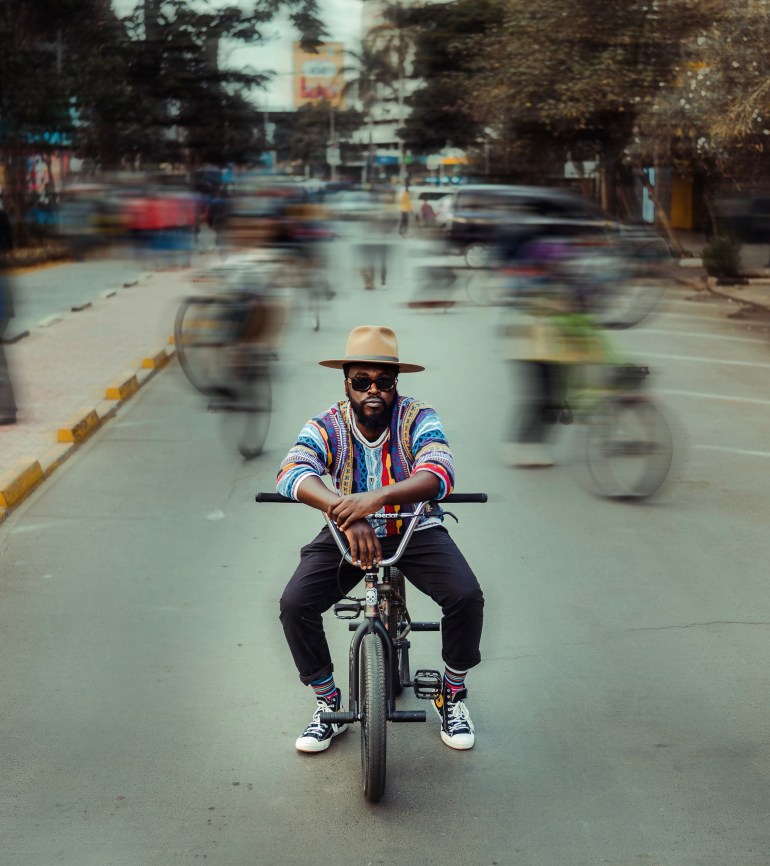[
Nairobi, Kenya – When the Grammy Awards announced the five inaugural nominees for the Best African Music Performance category in November 2023, only South Africa and Nigeria were represented. The news sparked debate about the continuing trend of contemporary music – amapiano and afrobeats – from both countries that dominate the 54-nation continent.
This was especially so in Kenya. The East African nation is one of the cultural giants of the continent and is therefore often a leader in many other areas. Yet, in much of Africa and the world, dance floors and airwaves are devoid of Kenyan music.
Some of today's most famous names, such as the boy band Sauti Sol, have achieved some degree of crossover across the continent and have received Grammy Awards for their work with their Nigerian and South African counterparts. But his fame and appeal still lags behind his counterparts.
Even within Kenya, amapiano and afrobeats enjoy frequent airplay. Bongo flava, a genre from nearby Tanzania, is also quite popular, perhaps partly because the songs are in Swahili, the main language of both countries.
When Universal Music Group (UMG) announced the launch of Def Jam Africa in 2020, the label announced locations in Nigeria and South Africa, but promised to sign music from across the continent. Other major record companies such as Warner Music and Sony Music have also set up shops in both countries. Although some of the signed artistes come from outside those music centres, Kenyans are yet to be included.
For Nairobi-based writer, music producer and record label executive Tabu Osusa, the reason for Kenya's absence from the continental center stage is clear.
“Kenyan music has no identity,” he told Al Jazeera.
According to Osusa, identity is a sound as well as a generational lineage; Groups of melodies, turns of phrase and rhythms that flow from one year to the next. He added, Afrobeats and Amapiano have them and they are distinctly African. By comparison, there is no existing equivalent in Kenya.

a shrinking identity
Kenyan music was characterized by the distinctive plucking sound of the guitar, played to imitate the traditional eight-stringed harp. When it was heard, everyone could tell what it was: benga music. Derived from the Luo word for beauty, benga took over Kenya in the 50s and 60s and spread across the continent during the 70s.
The musicians transferred the sounds of traditional western Kenyan songs to the guitar, giving the benga the distinctive pluck, pluck, plucking sound it is known for.
Osusa blames colonialism for the genre's extinction.
“When we got independence (in 1963), our fathers left everything in the village,” he said, referring to migration to urban areas in the 1970s. “Our culture, our food, our sense of dress, our music. They moved to the city to start afresh, and if anyone brought anything from the village he was given the name of Mashamba – which meant from the village.
“I don't know why we didn't take our culture to the cities,” Osusa said. “Nigerians did this, and that is why they have been able to make rural life fun and sexy (through their music). Nigerian musicians have always appreciated those who came before them – hence the continuity from the days of juju music to Afrobeats.
Bill Odidi, music writer for Business Daily Africa and radio presenter for Music Time in Africa, agrees with Osusa's hypothesis. He says that Kenyans lost their musical traditions and with it, their chances of breaking into the mainstream.
But he also believes that the political and economic situation in Kenya in the early days after independence “did not allow music to flourish”.
“Indigenous culture was really suppressed by the settler community,” Odidi said. “Those who came to power after independence continued to follow the same policies. They admired the Western and British lifestyle (more) than their own.”
caught in a loop
In accordance with Kenyan musicians, colonialism isn’t the one factor holding Kenyan musicians again.
One drawback is the apprehension of defining music as a profession.
“Plenty of artists are hesitant to enter music full-time,” mentioned Kenyan R&B singer Maya Amolo, who was acknowledged as one in every of Spotify's Recent Finds Africa artists of 2022. The purpose is that we’ve got not developed as an trade but. South Africa and Nigeria, they’ve been constructing and growing their music trade for a really very long time and we’ve got not. With out a working trade with some sort of construction, you gained't be capable to make any cash.
This creates an inevitable loop: the trade is underdeveloped as a result of individuals don't pursue the artwork full-time. Individuals don’t pursue artwork full-time as a result of the trade is underdeveloped.
“Blinky” Invoice Selanga, frontman of Kenyan different group Simply A Band, believes Kenyan followers and the native music trade must do extra for artists.
“We now have not rallied behind Kenyan music,” Selanga mentioned. “Historically the mic has not been given to us. Nigeria and South Africa, even Congo, have had music industries for a very long time. They're actually capable of amplify their voices, and so they stand behind their voices. Kenyan DJs push Afrobeats and Amapiano. “Nigerian DJs will not be doing the identical for us.”
Artists cite further causes for East Africa's incapacity to interrupt into the mainstream: in comparison with Nigerians, fewer Kenyans need to go away the nation (45 % versus 19 % in keeping with the Pew Analysis Heart), which has led to much less export of Kenyan tradition.
Studios in Kenya lack funding and the standard of manufacturing is usually years behind different African nations. Some say that the Kenyan music scene has been outlined by chasing the success of Nigeria and South Africa.
Selanga believes that regardless of this, the shortage of a unified sound is what makes Kenya an important place to study and develop as an artist.
“Kenyan music is certainly extra regional,” Selanga mentioned. “The Kenyan sound that’s round varies from place to position. The great thing about these variations is what makes us particular. Simply A Band couldn’t exist in some other nation in Africa.”

'They need to pay attention'
So as to rediscover the Kenyan sound and encourage individuals to pay attention, some artists are continuously working to prioritize their tradition.
Shipton Onyango, recognized by his stage title Winyo, has been a benga artiste for over 15 years. “I need to emphasize Benga music, make it contemporary and new just for the worldwide market that may establish with it,” mentioned the singer, who works with Osusa's Ketebul Music.
Whereas Winyo agrees with most of Osusa's visions, he additionally agrees with a few of his friends that there must be much less give attention to the revival of the previous and extra on the sounds of the current in an effort to deliver Kenyan music to the primary stage.
A number of the new music that’s being made is unusual, some isn’t. However nonetheless not sufficient persons are listening.
“Individuals need to know what the Kenyan sound is and how one can work with it,” Vinyo mentioned. “I feel a number of musicians within the trade have gone again to the drafting board. They need to know what the Kenyan sound is. You’ll be shocked to know that many Kenyans love Kenyan music. They need to hear it. There’s a market there.”

